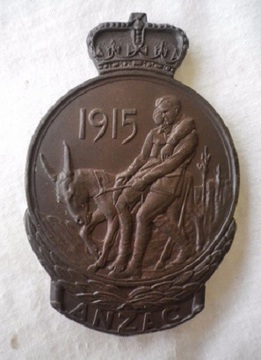HAUGH, Charles George
| Service Numbers: | 490, V92193, V352570 |
|---|---|
| Enlisted: | 24 August 1914, Broadmeadows, Victoria |
| Last Rank: | Lieutenant |
| Last Unit: | 60th Infantry Battalion |
| Born: | Camperdown, Victoria, 25 November 1893 |
| Home Town: | Camperdown, Corangamite, Victoria |
| Schooling: | Not yet discovered |
| Occupation: | Painter |
| Died: | Natural causes, Camperdown, Victoria, 1980 |
| Cemetery: | Not yet discovered |
| Memorials: |
World War 1 Service
| 24 Aug 1914: | Enlisted AIF WW1, Private, 490, Broadmeadows, Victoria | |
|---|---|---|
| 19 Oct 1914: | Involvement AIF WW1, Private, 490, 8th Infantry Battalion, Enlistment/Embarkation WW1, --- :embarkation_roll: roll_number: '9' embarkation_place: Melbourne embarkation_ship: HMAT Benalla embarkation_ship_number: A24 public_note: '' | |
| 19 Oct 1914: | Embarked Private, 490, 8th Infantry Battalion, HMAT Benalla, Melbourne | |
| 25 Apr 1915: | Involvement AIF WW1, Private, 490, 8th Infantry Battalion, ANZAC / Gallipoli | |
| 8 May 1915: | Wounded AIF WW1, Private, 490, 8th Infantry Battalion, ANZAC / Gallipoli, Battle of Krithia, GSW (left thumb) | |
| 31 Mar 1916: | Transferred AIF WW1, Private, 46th Infantry Battalion | |
| 30 Sep 1916: | Transferred AIF WW1, Private, 60th Infantry Battalion | |
| 31 Jan 1919: | Discharged AIF WW1, Private, 490, 60th Infantry Battalion |
World War 2 Service
| 27 Mar 1941: | Enlisted Australian Military Forces (WW2) , Private, V92193 | |
|---|---|---|
| 27 Mar 1942: | Enlisted Australian Military Forces (WW2) , Lieutenant, V352570 |
Help us honour Charles George Haugh's service by contributing information, stories, and images so that they can be preserved for future generations.
Add my storyBiography contributed by Paul Trevor
'Private C. G. Haugh.
Private Charles Haugh, news of whose wounding while in action at the Dardanelles, was released on Monday night, is a native of Camperdown, and the third son of Mr and Mrs J. C. Haugh, of Manifold street. Private Haugh is 22 years of age, and is a painter by trade. He offered his services at the front shortly after the outbreak of the war, and became attached to the 8th battalion of the First Australian Expeditionary Force. He was well liked in Camperdown and was always extremely popular with the local young men. He was for a number of years an active member of the Camperdown Brass Band, and was ever a keen football enthusiast, having last year acted as trainer and boundary umpire for the Camperdown Football Club.' from Cobden Times and Heytesbury Advertiser 5 Jun 1915 (nla.gov.au)
'PRIVATE CHAS. HAUGH.
Private Charles Haugh, was again wounded, writes from Malta where he was being treated:-
Just a few lines to let you know I am getting all right, I wrote to you from Alexandria, but don't know whether you received the letter or not. We were doing a big attack on the 8th of May, and when we had gone about a mile and a half I got hit on the thumb, but did not stop - just bandaged it up and went on. I got weak from the loss of blood, however, and had to "chuck it," worse luck.
We just had them nicely on the run. The enemy put up a stand, but we were too much for him. The British could not make it out. We had to pass over their trenches in the firing line. They thought we were going to stop with them, but we were out to make a name for ourselves. We got tuned up badly, but I reckon the Turks lost about three times as many. It is nerve-racking, this baptism of fire, mid screaming shells and a shower of bullets. The shells, when you hear them, have got past you, but it is natural to duck. The worst days we had were 25th April and 8th May. We landed on the 25th, and just as we got to the shore a big burst of shrapnel came close to us, but missed everybody. The fighting lasted till 5 p.m.
Of course we were handicapped through having no artillery, and as the war ship did not know where we were they could not back us. Thus it was infantry against artillery and infantry. We stuck to it all day in the open, and then, as soon as it got dark, dug ourselves into trenches, so were pretty safe. We were five days in the trenches before being relieved; then we had a couple of days' spell, and after that more trench. We Victorians were shifted to where the French and British were, and had a big advance to tackle. I don't know why they picked us, but I suppose it was because we were the best.
I came across Doug. Blackburn after we had been at work ten days. He was all right, and although he had temporarily lost the run of his regiment he managed to regain it, I have been away from the firing line nearly two weeks now, and am nearly better. The wound is nearly healed up. The bone is a bit bruised but not broken. The bullet skidded on it. Merritt got wounded the same day as myself. I was put on a different boat, but I saw him at the dressing station about a mile from the firing line, and he looked all right. The people here are great workers for the wounded, and seem to think they cannot do enough.' from Camperdown Herald 10 Jul 1915 (nla.gov.au)











